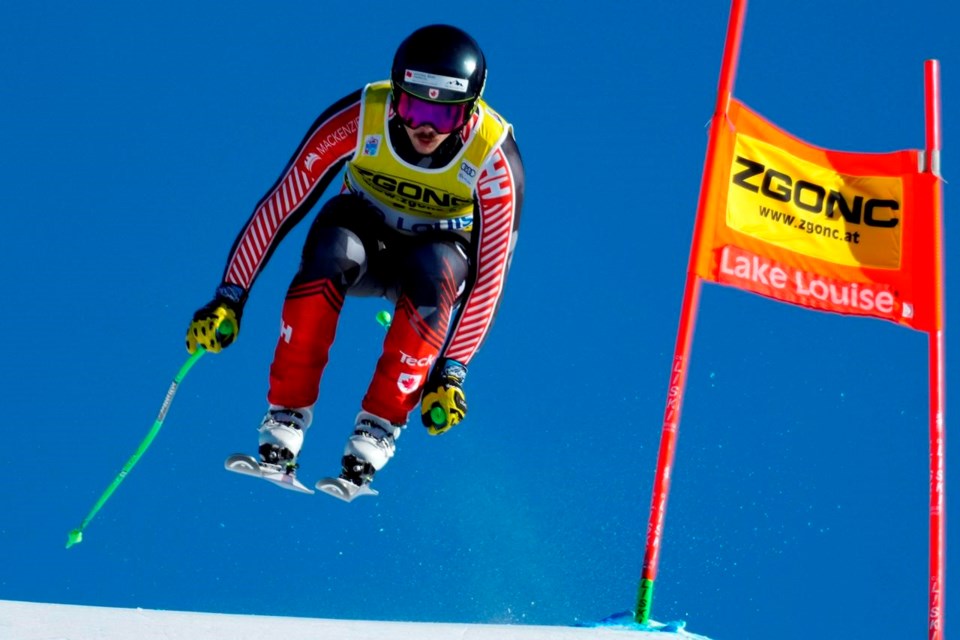LAKE LOUISE, Alta. — Canadians climbing the men's downhill racing ladder as a group and challenging European domination is a familiar script.
Canada is coming off a season in which three men reached the World Cup podium for the first time in their careers, and James Crawford earned an Olympic medal.
The team's culture has parallels with the recent "Canadian Cowboys" era, as well as last century's "Crazy Canucks", in that fierce internal competition drives their performance, and breakthrough results float others' boats.
"You're legitimately happy for your teammate and it fires you up and makes you want to do the same thing," is Brodie Seger's description of the team dynamic.
Ranging in age from 25 to 28, Toronto's Crawford, Cameron Alexander of North Vancouver, B.C., Seger and Broderick Thompson of Whistler, B.C., and Calgary's Jeff Read use each other as benchmarks to chase the personal bests that move them up the rankings and into the medals.
"I definitely think it stems from just a group of guys who are all pretty good friends off the hill, but also extremely competitive between one another," Crawford explained. "We don't have it very often where we let that get between us, but I think now it's in a very healthy place where we're all kind of feeding off each other."
The 2022-23 men's downhill season starts Friday in Lake Louise, Alta., followed by super-G races Saturday and Sunday in the lone Canadian stop on the World Cup alpine racing circuit.
Reigning overall World Cup champion Marco Odermatt of Switzerland posted the fastest time in Thursday's final training session. Crawford was third.
Two-time world champion Erik Guay led the Canadian Cowboys era from 2002 to 2020 when world champion downhiller John Kucera, Manuel Osborne-Paradis, Jan Hudec and Dustin Cook all stood on podiums at different times.
Steve Podborski, the first North American to win the men's overall World Cup downhill title in 1982, and Jeff Read's father Ken, the first Canadian to win a men's downhill in 1975, fuelled the Crazy Canucks' success.
Kucera coaches Canada's current crop of downhillers and sees parallels with his generation.
"Where the real parallel is it's a group, right?" Kucera said. "It's not just one individual. It's not just one guy coming in or two guys. Once you start seeing five or six of them hitting on a regular basis, that's what's going to be really cool.
"We were five or six individuals that came from different parts of the country. We were different ages. We all brought something to the table that was complementary to somebody else. These guys now, they're different on that level because they have basically all grown up together. They're really tight knit. They're almost like a band of brothers, in a sense."
Seger and Crawford finishing fourth in super-G and alpine combined respectively at the 2021 world championship in Cortina, Italy, was an indicator of emerging talent.
Crawford followed up his Olympic bronze in alpine combined in February with a World Cup super-G silver the following month in Kvitfjell, Norway. He also placed fourth in downhill and sixth in super-G in Beijing.
"I personally found pretty good consistency with what I was doing," Crawford said. "The rest of the team was a little less consistent and that doesn't take away from the fact that all of them were skiing to the exact same or higher level than me with regards to their actual ability.
"Coming into the season, it seems like everybody has their heads in the right place. We've done some good work and I wouldn't be surprised if all the other guys are right there with me contending day in day out and not just having odd result."
Alexander, who won't race in Lake Louise, won a men's downhill in Kvitfjell after losing almost two seasons to a knee injury. He recently wrote in an Instagram post that he reinjured the knee while dryland training at the end of last season.
Thompson was third in a super-G in Beaver Creek, Colo., a year ago for his first World Cup medal.
"That podium last year gave me confidence and I think it gave my teammates confidence as well," Thompson said. "If we all go as hard as we can, one of us is bound to be on the podium."
Read achieved his first downhill top-10 in downhill in Kvitfjell. Seger ranked fourth after the downhill leg of the Olympic alpine combined.
"I think our entire team is starting to show the top-end speed that is competitive, and I have no doubt there's going to be some more podiums among this crew moving forward," Read said.
"We're at a place now that we're got enough time on all the tracks and we're no newbies. We have the experience, we know where to push it to be fast."
The Crazy Canucks moniker came from a European journalist, while the Canadian Cowboys label was a marketing initiative by Alpine Canada.
The Norwegians are known as the "Attacking Vikings" on the circuit.
This edition of the Canadian men's downhill team has yet to settle on their unofficial title.
"It has to come organically," Read said. "It's not something you can really make up and force on others. I'm sure it will come when we're all pushing for the top."
This report by The Canadian Press was first published Nov. 24, 2022.
Donna Spencer, The Canadian Press



